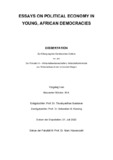Citation link:
http://dx.doi.org/10.25819/ubsi/10161Files in This Item:
| File | Description | Size | Format | |
|---|---|---|---|---|
| Dissertation_Alexander_Stoecker.pdf | 2.21 MB | Adobe PDF |  View/Open |
| Dokument Type: | Doctoral Thesis | metadata.dc.title: | Essays on political economy of young, African democracies | Other Titles: | Aufsätze zur politischen Ökonomie von jungen, afrikanischen Demokratien | Authors: | Stöcker, Alexander | Institute: | Fakultät III - Wirtschaftswissenschaften, Wirtschaftsinformatik und Wirtschaftsrecht | Free keywords: | Partisanship, Corruption, Political favoritism, Africa, Economic development | Dewey Decimal Classification: | 330 Wirtschaft | GHBS-Clases: | PJW PMX |
Issue Date: | 2022 | Publish Date: | 2022 | Abstract: | The "new institutional economics" perspective has become an integral part of the literature on economic development identifying the institutional structure as a deep determinant of development. However, this literature is overwhelmingly based on the experiences of the established Western democracies and it remains highly questionable if its findings can be equally applied to the very different African context. Ultimately, several questions can be raised here: How deep are the roots of democratic institutions in Africa? How effective are the constraints on the political elite? And what does this entail for the distribution of resources? This thesis tries to provide some insights into these questions by studying them from three angles. First, it addresses the behavior of citizens. Second, it deals with the perspective of the political elite. Lastly, it takes a more encompassing view on specific governance outcomes. Die Sichtweisen der "Neuen Institutionenökonomik" ist zu einem festen Bestandteil der Literatur zur wirtschaftlichen Entwicklung geworden, die die institutionelle Struktur als einen tiefgründigen Bestimmungsfaktor der Entwicklung identifiziert. Allerdings basiert diese Literatur überwiegend auf den Erfahrungen der etablierten westlichen Demokratien und es bleibt fraglich, ob ihre Erkenntnisse gleichermaßen auf den sehr unterschiedlichen afrikanischen Kontext übertragbar sind. Letztlich können hier mehrere Fragen aufgeworfen werden: Wie tief verwurzelt sind die demokratischen Institutionen in Afrika? Wie wirksam sind die Restriktionen für die politische Elite? Und was bedeutet dies für die Verteilung von Ressourcen? Diese Arbeit versucht, einige Einblicke in diese Fragen zu geben, indem sie sie aus drei Blickwinkeln untersucht. Zunächst wird das Verhalten der Bürger behandelt. Anschließend befasst es sich mit der Perspektive der politischen Elite. Zum Schluss wird ein umfassenderer Blick auf spezifische Governance-Ergebnisse geworfen. |
DOI: | http://dx.doi.org/10.25819/ubsi/10161 | URN: | urn:nbn:de:hbz:467-22508 | URI: | https://dspace.ub.uni-siegen.de/handle/ubsi/2250 | License: | http://creativecommons.org/licenses/by-nc-nd/4.0/ |
| Appears in Collections: | Hochschulschriften |
This item is protected by original copyright |
Page view(s)
314
checked on Dec 25, 2024
Download(s)
164
checked on Dec 25, 2024
Google ScholarTM
Check
Altmetric
This item is licensed under a Creative Commons License


